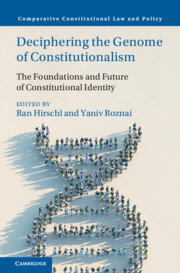Book contents
- Deciphering the Genome of Constitutionalism
- Comparative Constitutional Law and Policy
- Deciphering the Genome of Constitutionalism
- Copyright page
- Contents
- Figures
- Contributors
- Preface
- Acknowledgments
- Introduction
- Part I Foundations, Theory, and Concepts
- Part II Comparative Perspectives
- 8 Confucian Constitutional Identity
- 9 ‘(A-)Religious & Democratic’ Militant Dual Constitutional Identities and the Turn to Illiberalism
- 10 Constitutional Identity in Bangladesh
- 11 Clashing Identities?
- 12 Imposed Revolution?
- 13 India
- Part III American Constitutionalism and Constitutional Identity
- Part IV Emerging Trends
- Index
- References
11 - Clashing Identities?
Traditional Authority and Constitutionalism in Africa
from Part II - Comparative Perspectives
Published online by Cambridge University Press: 14 March 2024
- Deciphering the Genome of Constitutionalism
- Comparative Constitutional Law and Policy
- Deciphering the Genome of Constitutionalism
- Copyright page
- Contents
- Figures
- Contributors
- Preface
- Acknowledgments
- Introduction
- Part I Foundations, Theory, and Concepts
- Part II Comparative Perspectives
- 8 Confucian Constitutional Identity
- 9 ‘(A-)Religious & Democratic’ Militant Dual Constitutional Identities and the Turn to Illiberalism
- 10 Constitutional Identity in Bangladesh
- 11 Clashing Identities?
- 12 Imposed Revolution?
- 13 India
- Part III American Constitutionalism and Constitutional Identity
- Part IV Emerging Trends
- Index
- References
Summary
In his path-breaking book, Constitutional Identity, Gary Jacobsohn not only elucidates the role of constitutional identities but also envisions the coexistence of “seemingly irreconcilable visions of national identity” within a constitutional order. The resulting disharmony he argues is critical to the development of constitutional identities. This chapter asks whether the continued existence and even incorporation of forms of governance that explicitly contradict the founding values of a constitution are simply disharmonic or do they pose a direct threat to the continued existence of a constitutional order? If the latter, we might ask whether differentiating between those social and constitutional elements that are simply disharmonic, and thus productive elements of a constitutional order, and those that might pose a fundamental threat to the constitutional order, might not produce a more sustainable constitutionalism. In sub-Saharan Africa “traditional authority” exists in many forms, including through institutional recognition in many constitutions whose founding values include democracy and human rights. While there is debate over both the nature of democracy and the content of human rights in Africa, the assumption in this chapter is that traditional authorities, represent either a disharmonic element within or an existential threat to democratic and liberal constitutions.
Keywords
- Type
- Chapter
- Information
- Deciphering the Genome of ConstitutionalismThe Foundations and Future of Constitutional Identity, pp. 138 - 149Publisher: Cambridge University PressPrint publication year: 2024

